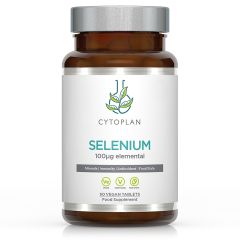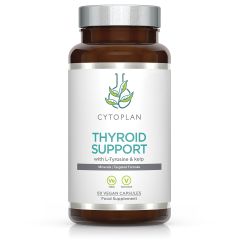5 ways selenium can support your health
Selenium is a trace mineral that is essential for human life. We need an adequate level of selenium for the appropriate functioning of a number of selenium-dependent enzymes known as selenoproteins, which play a role in our antioxidant defense, thyroid hormone metabolism and immune response – and therefore are essential for optimal health.
Here we take a closer look at some of the ways this essential mineral supports our health…
Antioxidant Role
Selenium is a potent antioxidant nutrient. Free radicals are a normal by-product of cell processes in the body, but when we are exposed to factors such as pollution, toxins, poor nutrition, stress, UV exposure and other external factors, we can experience an excess of free radicals. Our body has a natural antioxidant defence system, but when this becomes[HD1] overwhelmed, free radicals can cause damage to cells, which is often at the heart of many chronic diseases. Including optimal levels of antioxidant nutrients such as selenium in your diet can help to neutralise excess free radicals and protect the health of your cells.
Thyroid Health
Your thyroid gland controls numerous essential bodily processes, influencing appetite, sleep, temperature, weight and energy levels. The concentration of selenium in the thyroid gland is higher than in any other organ in the body and, along with iodine, selenium has several essential functions in thyroid hormone synthesis and metabolism. For example, it is required to produce the active thyroid hormone T3 and a deficiency in selenium can inhibit the conversion of thyroid hormones into the form that is required by the cells.
Immune Health
Probably one of selenium’s best known health benefits is its role in supporting optimal immunity. Selenium plays essential roles in the production, activation and optimal function of a number of different immune cells, so can influence both our innate and adaptive immunity. There is evidence of selenium and selenoproteins playing an important role in the production of eicosanoids; signalling molecules involved in inflammatory responses, and a deficiency of selenium has been associated with impaired immunity and chronic inflammation.
Male fertility
Selenium is essential for normal sperm function, and therefore plays an important role in male fertility. Adequate levels of dietary selenium are needed for testosterone synthesis, as well as normal sperm maturation and motility. Sperm cells are highly susceptible to oxidative damage, and selenium as an antioxidant can neutralise free radicals to protect sperm, and the DNA they carry, from damage.
Musculoskeletal Health
Osteoarthritis (OA) is a common condition, characterised by the destruction of cartilage in joints, and oxidative stress of chondrocytes (the cells that make up cartilage) is a major factor in the development of OA. Selenium plays an important protective role against oxidative stress and may, therefore protect the function of chondrocytes, but it is also thought to provide pro-anabolic effects to support cartilage repair and regeneration.
Selenium also exerts protective qualities for bone health, and the bones have the second highest proportion of selenium in the body. A higher dietary selenium intake is associated with higher bone mineral density and a lower risk of conditions like osteoporosis. Oxidative stress can be very damaging to bone tissue, so selenium’s antioxidant properties are likely to account for its protective role in bone health.
Food Sources of Selenium
Because selenium in foods is protein bound, foods that are high in protein tend to be the best sources of selenium. Brazil nuts, seafood, meat, poultry, and organ meats are the richest food sources, with wholegrains and dairy product also providing a source. The amount of selenium in plant-based foods depends on the amount and form of selenium in the soil and varies greatly by geographical region. Selenium levels in food are greatly reduced by heat, processing and cooking, and refining of grains reduces the selenium content by 50-70%.
Selenium Supplements
The average Western dietary selenium intake is 35mcg, but a total intake of 185mcg has been suggested for optimal health. This means that most people would benefit from taking a selenium supplement around 150mcg per day.
Selenium enriched yeast is a supplemental form of the mineral with several benefits:
- It is a natural, organic form of selenium
- It contains selenomethionine, which is extremely bioavailable
- It is documented by the European Food Standards Agency as the safest and most bioeffective form of selenium
- As a food-state form of selenium, it is absorbed more easily by the body than inorganic selenium
- It is complete with all the amino acids and other phytonutrients with which this mineral is found in food





